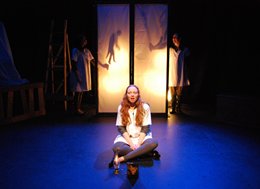Devised by Moonfish from the children’s book, The Secret Garden brings to life a tale of grief, isolation, companionship and reconciliation. Following the death of her parents, Mary Lennox is sent to live in her Uncle’s home on the moors. With her uncle away travelling, the mansion appears deserted apart from a few servants. The vast, remote space compounds this petulant young girl’s loneliness. Then, she becomes intrigued by the mysteries surrounding her, finding friendship in unlikely places.
This production was expertly developed as an ensemble. The whole team contributed to the costume choices, adaptation and direction, as well as helping to design and construct the set. The latter was simple and rather sparse, comprising wooden frames, furniture draped in sheets and boxes containing stage props. This worked wonderfully on both practical and aesthetic levels. Accompanied by Úna Ní Fhlanagáin’s magical yet melancholic introductory harp notes, it aptly appeared like a room in an abandoned house. Here, music and visual image promoted anticipation, evoking hidden treasures, mystery and sadness in keeping with the source story’s themes and motifs.
 Moonfish skilfully combined a variety of theatrical styles including realistic elements, narration, shadow puppetry and verse. A rhythmic chant of “Mistress Mary, quite contrary” introduced the main character and conveyed a sense of anxiety. The stories told about Mary’s hunchbacked uncle, Archibald Craven, were enlivened using small figures in silhouette on a backlit screen; this made them all the more elusive and mysterious. Throughout the piece, performative features such as these intensified the tale’s mystical quality.
Moonfish skilfully combined a variety of theatrical styles including realistic elements, narration, shadow puppetry and verse. A rhythmic chant of “Mistress Mary, quite contrary” introduced the main character and conveyed a sense of anxiety. The stories told about Mary’s hunchbacked uncle, Archibald Craven, were enlivened using small figures in silhouette on a backlit screen; this made them all the more elusive and mysterious. Throughout the piece, performative features such as these intensified the tale’s mystical quality.
Each of the actors contributed to the role of Mary. This created a fluid character that was at first jarring, but quickly blended with the work’s hybrid style. It was most effective as Mary sat silently on the train en route to her new home. Her expressions conveyed her feelings, while the other actors – also visible on stage – voiced her thoughts. During these moments, the multifarious voices of her character paradoxically served to deepen the sense of her solitude.
Mike O'Halloran’s lighting atmospherically helped to juxtapose the dim and stifling house with the liberating, sunlit outdoors, culminating in the brightly-lit moment when Mary, her sick cousin Colin and a local boy called Dickens entered the secret garden in awe. The production sensuously portrayed a progressive appreciation of nature as Mary and Colin journeyed towards happiness and wellbeing.
Moonfish's The Secret Garden breaks the boundaries of the kinds of schematic dramas commonly viewed as accessible. Impressively, it eclectically locates itself within the avant-garde, whilst maintaining a gripping linear narrative. With this production, Moonfish offers an enchanting, multi-layered show to captivate children and adults alike.
Siobhán O’Gorman is currently completing a doctoral research project on gender and the canon in contemporary theatre at the National University of Ireland, Galway.